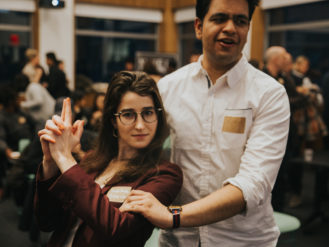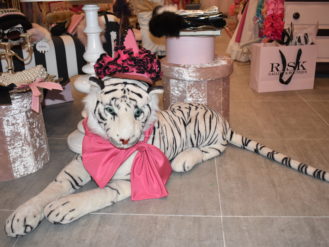How a Muslim Designer Creates Fashion With Flair
Mixing ingenious blends of old and new, Brooklyn's Nzinga Knight makes a name for herself in the growing market for modest womenswear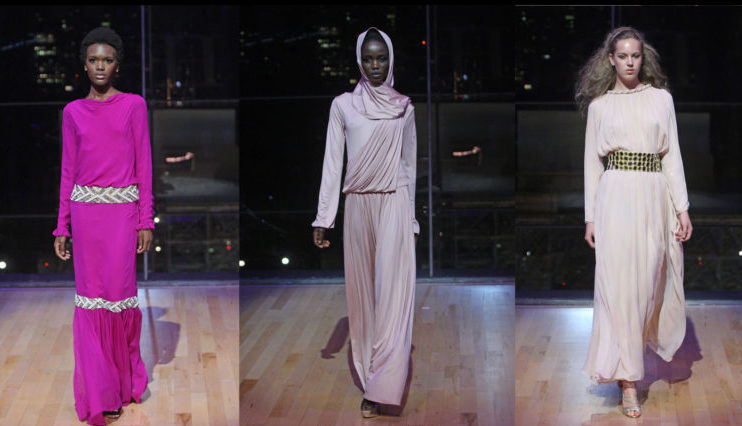
In a runway show, models wear gowns with and without the traditional hijab (Photo courtesy of Nzinga Knight)
The first few articles of clothing Nzinga Knight designed were strictly for herself. She had a wedding to attend and couldn’t find something to wear that she found both fashionable and modest, in keeping with her Muslim faith. So she designed her own gown.
Fast forward a few years and she is now the proprietor of her own Brooklyn-based fashion line, Nzinga Knight New York, which has shipped its high-end apparel to retail stores and e-commerce customers in more than 30 countries. In 2014, Knight was the first contestant on the design-focused reality show Project Runway to wear a hijab, the head covering worn by many Muslim women.
Knight has found a promising business at the intersection of style and Muslim culture, where women seeking to be both modest and elegant had few satisfying choices. Knight’s look draws on tradition, but with a contemporary sensibility. “I’m interested in not only having a sense of what I want as a designer, but also having a sense of what’s in the air and what is socially, culturally and emotionally relevant for people,” Knight said in a Brooklyn café near her Clinton Hill studio on a chilly December morning.
While Knight is devoutly religious herself, her fashion line takes an ecumenical approach. Her designs range from seriously modest, with built-in hijabs, to gowns with a more flamboyant spirit. “I have a good amount of Muslim clientele and then I have a good amount of women who are of various other faiths or non-faiths who love the clothing,” she said.
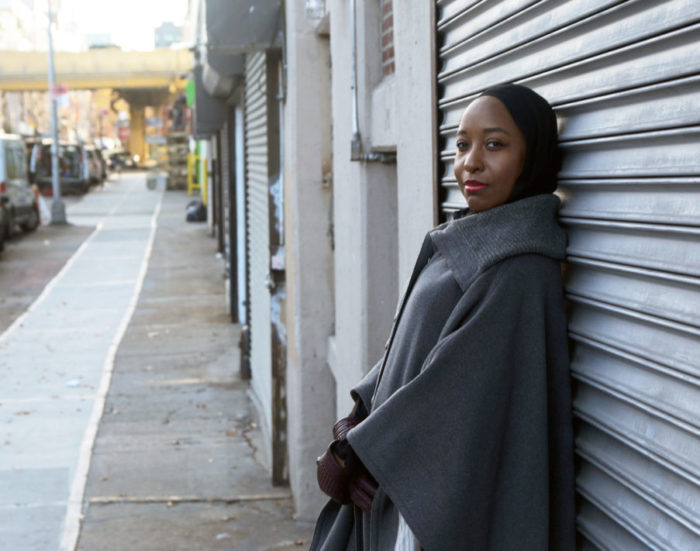
The designer near her studio in the Clinton Hill neighborhood (Photo by Katie Warren)
Knight, who shares her given name (pronounced Nuh-ZING-gah) with a celebrated African queen, is a Brooklyn native of Trinidadian descent who describes her family as “seven vibrant Caribbean women where great modest fashion was paramount.” She began dabbling in design as a child when her uncle, a fashion designer himself, let Knight work with him in his studio.
Knight’s formal training in fashion began later with classes at the Fashion Institute of Technology (FIT) in Manhattan while attending high school at Brooklyn Tech. From there she enrolled at Brooklyn’s Pratt Institute, where she earned a BFA in fashion design. While in school, Knight spent weekends designing prom dresses for friends or costumes commissioned by neighborhood filmmakers. “I would make like $300 there, $600 here,” she said. Although her personal style is modest, if her customers wanted a dress to be “backless or low, cleavage and all that kind of stuff, then I’d do that,” she said.
Her time at Pratt was defined by a class project in which a professor asked students to choose a culture other than their own from which to pull inspiration and design a collection. Knight was at a loss over which culture to choose until she stumbled across a book that had been mistakenly sent to her house years before, a book of photography about the cultures of women in eastern Africa.
The styles immediately struck her. “They were really at one with their fashion and the way they decorated themselves,” Knight said. “There were women who were garbed modestly with head scarves and then they would have gold jewelry that hung from their nose to their ear. It was wild, amazing, and eclectic, but it seemed like it was for their everyday life.”
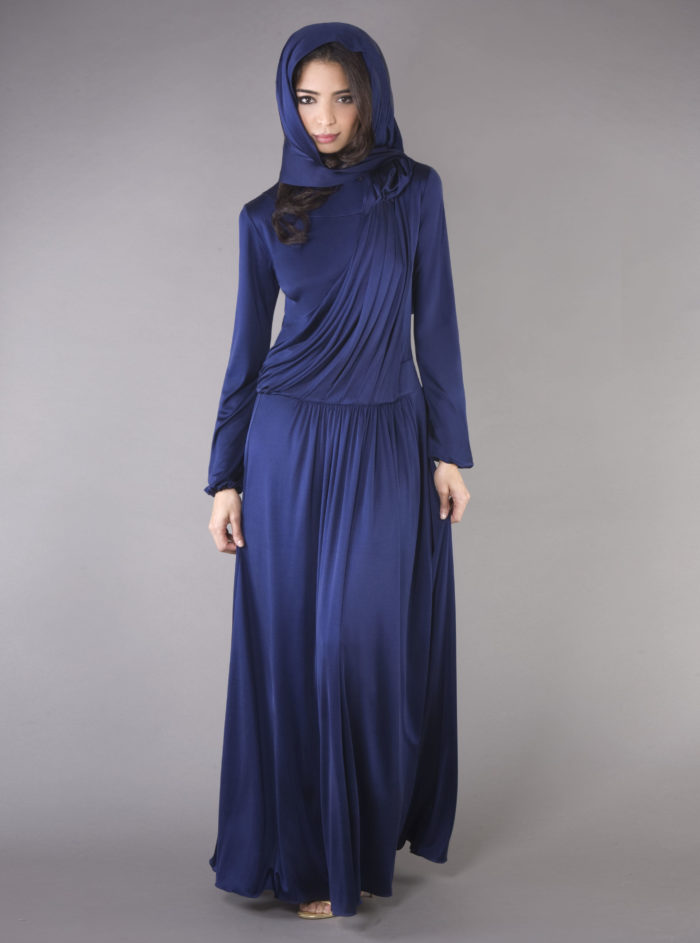
A Knight design called the Twareg, described on her site as “an edgy and modest silk jersey dress with versatile combined shawl worn as hijab” Photo courtesy of Nzinga Knight)
She built a collection inspired by the women, making it personal through her own experience of finding a sense of place as a Muslim person living in a non-Islamic culture, she said. “My personal culture, whether it be my Caribbean family and heritage and my New York upbringing, does not have any Islamic roots culturally,” she said. “It’s not like where some people, they’re Pakistani and most Pakistanis are Muslim. I filter my culture through an Islamic lens.”
Her collection won a design competition held by the Council of Fashion Designers of America, which came with a scholarship. Her professors at Pratt continued to encourage her to incorporate her own sense of identity into her work. “When it comes to buying a lot of different things–products, clothing–I think people enjoy a personal story and authenticity,” she said.
Knight took a spin through the fashion industry for a few years, including an internship at Marc Jacobs Group and a stint at Jones New York, but her destiny was to design her own line. She started with a small collection in 2007 and then launched Nzinga Knight NY in 2010. Knight never consciously planned to launch her clothing line with evening gowns, but after creating one for herself, she realized how attracted she was to the shapes and the soft, luxurious fabrics.
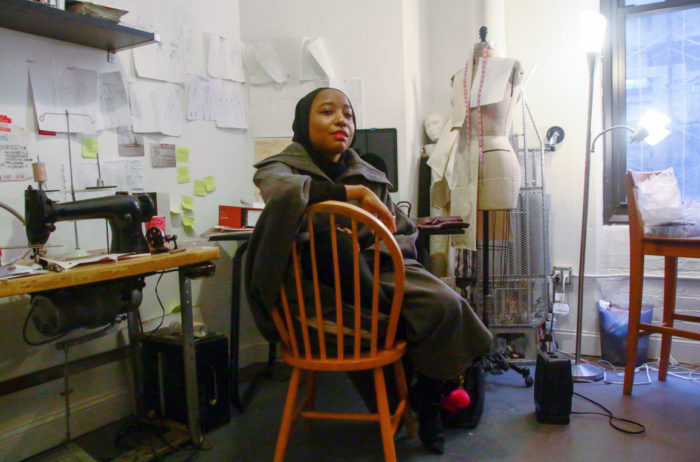
Knight in her studio, where she’s working on a new collection
The market for modest fashion with flair is potentially huge, given the world’s 1.8 billion Muslims, several hundred thousand of whom live in New York City. Several major fashion companies have recognized the opportunity, launching Muslim-oriented fashions. Last year Nike introduced a “pro hijab” aimed at female Muslim athletes, while the full-body swimsuit dubbed the “burkini” has been making waves, as well as headlines.
“Mainstream fashion is now talking about modest fashion as a thing. Ten years ago, if you were a brand coming from a religious background and tried to sell it in a department store, calling it a modest or Muslim brand would be a kiss of death,” Reina Lewis, a professor at the London College of Fashion, told the Associated Press. While most buyers of such apparel and young, cosmopolitan Muslim women, “the term ‘modesty’ emerged in the niche market as a useful one because it’s not faith-specific,” Lewis added.
Some designers have missed the mark, however, Knight said. Donna Karan’s Ramadan collection, launched in 2014, was modest in spirit but didn’t line up with how Muslim women function during the month of Ramadan, Knight feels, because the designs were too casual. “The thing about Ramadan is that you’re going out just about every night to a dinner party,” she said. “If you’re in the Middle Eastern market, you are the least casual of a dresser during Ramadan.”
As a company founder, what Knight finds most challenging are the non-design aspects: marketing, coordinating with buyers and factories and fundraising. For her last collection, Knight needed to raise about $10,000 over a few weeks to buy fabrics and supplies. She sought out investments from friends and donations through a program she calls Sponsor a Dress; for around $1,500, a donor gets to name the dress.
Knight says she is wary of pursuing deep-pocketed investors because of the corrosive effects of the patriarchy in big business, an issue all the more relevant in the era of #MeToo. “I feel like I’ve been probably affected by patriarchy more than I’ve ever cared to admit,” Knight said. “I was thinking about how, no matter where you are on the spectrum of dress, men are always trying to have a say in the matter.”
Knight recalls “the struggles I had when I tried to get partners and supporters for my business several years ago. It was tough. Guys just about always wanted something more and it was stressful and confusing and disheartening.” At this point, she’s intent on “dismantling the patriarchy’s control over my life and psyche.”
What that means to her is finding business partners who respect not just the products and their potential but also the creative force behind them. “I think sometimes that’s missed on people when they don’t want to presume that a woman, or to be specific myself, has been given a great mind and inspiration and integrity around what I do. And that what I do isn’t something that everyone is coming up with ideas for, can do, or would care to do well. So every now and then I find myself having to stick up for myself when I see patriarchy rear its ugly head,” she said. “When I’m the boss, there is no need or space for that at all.”
In a video accompanying her Project Runway appearance, Knight offered a peek inside her closet (Video by Project Runway via YouTube)
For her next collections, Knight is branching out into coats and more casual dresses. Evening gowns, which she designs for private clients for weddings or other special events, are still an integral part of her business, but she’s under no illusion that her gowns, which range from $685 to $790 on her website, are every customer’s necessity. “It’s like buying a piece of cake,” she said. “You don’t need it. But you really want it, and you’re not going to get it unless it really looks good.”
Opening a brick-and-mortar store could be in the cards at some point, but for the moment Knight is focused on designing her new collection and running a second business brewing and selling sorrel, a traditional Caribbean holiday drink made with the sorrel flower, ginger, cloves and other spices. She launched Brooklyn Brewed Sorrel after bringing a batch to a party and discovering it was a hit among her friends. It might seem like a complete divergence from her fashion sensibility until one reads the product description: “a complex spiciness that often feels like an effervescent burst.”





